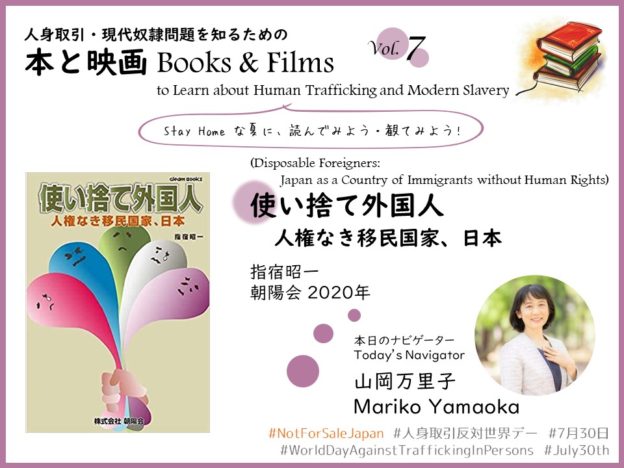*This book is not translated in English yet.
“I’m so grateful to have this man in Japan!” Shoichi Ibusuki is one of those people who makes you feel this way. Although not mentioned in the book, he became involved in labor union activities when he was still a student and became a lawyer out of necessity (and he’s taken the bar exam 17 times!). He is an activist at heart and a hero of justice.
Although the title of this book, published just this year by Mr. Ibusuki, is provocative, the text is an easy-to-read introduction to the problems of foreign nationals, spelling out the facts in a straightforward and concise manner. Even so, the book makes my hands tremble with indignation at such irresponsible and inhuman practices in companies and organizations, as well as at the government for allowing them to go unchecked: “300 yen per hour” for technical interns, “98% of interns fail to report violations of the Labor Standards Act,” “raped by the president more than 50 times,” “interns forced to return to their home countries through use of violence and threats,” “discrimination against Muslims,” and so on.
The first half of the book explains the problem of exploitation of foreign workers, citing cases in which the author was involved as a lawyer. However, in the second half of the book, Ibusuki talks about human rights violations by the Immigration Services Agency, which he describes as “even worse and more desperate than the problem of interns.”
Even refugees who have escaped persecution in their home countries and apply for asylum are treated as illegal aliens. If they disobey deportation orders, they are detained in prison-like immigration facilities. Even if they are granted provisional release, they have no idea when they will be detained again. The detention is indefinite and prolonged, with people suffering physical and mental illnesses, attempting suicide out of despair, and even dying from hunger strikes in protest. The agency practices harsh behavior such as placing dozens of people on chartered planes and “deporting” them back to their home countries. But as the mass-repatriation is costly, their strategy is to prolong detention, so that detainees will lose patience and return home at their own expense. I think this immigration policy, which does not recognize human rights for foreigners, is a particularly ruthless one in Japan.
True multicultural coexistence cannot be achieved without seeing people as people. In order for Japan to regain respect in the international community, it cannot remain as a “country of immigrants without human rights”. I would like to recommend this book to many people as a reminder of this fact. (Mariko Yamaoka)
(Written by Shoichi Ibusuki, Published in 2020 by Choyokai, 136p, 1,000yen+tax, https://www.gov-book.or.jp/book/detail.php?product_id=352320)

